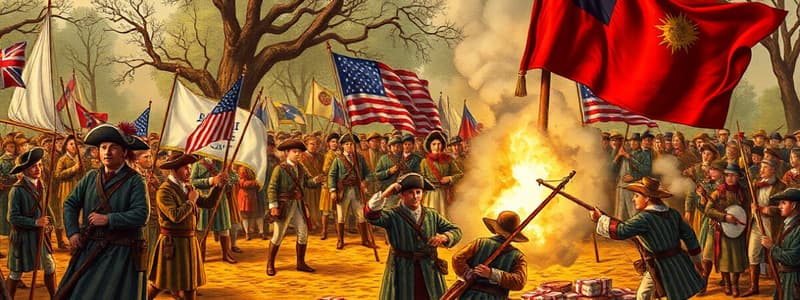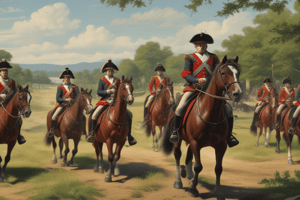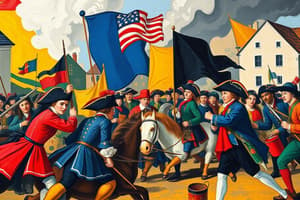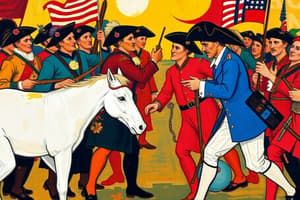Podcast
Questions and Answers
What was a key effect of the Columbian Exchange on native populations?
What was a key effect of the Columbian Exchange on native populations?
- Formation of new alliances
- Population decline due to diseases (correct)
- Increased agricultural productivity
- Expansion of landownership
The Virginia House of Burgesses was the first elected legislative assembly in the American colonies.
The Virginia House of Burgesses was the first elected legislative assembly in the American colonies.
True (A)
Who authored 'Common Sense' and what was its primary purpose?
Who authored 'Common Sense' and what was its primary purpose?
Thomas Paine; to advocate for independence from Britain.
The __________ system was introduced to encourage settlement in Virginia by granting land to settlers.
The __________ system was introduced to encourage settlement in Virginia by granting land to settlers.
Match the following events with their significance:
Match the following events with their significance:
Which event marked the beginning of the American Revolution?
Which event marked the beginning of the American Revolution?
Bacon’s Rebellion was a conflict primarily between native Americans and settler colonists.
Bacon’s Rebellion was a conflict primarily between native Americans and settler colonists.
What was the main purpose of the Navigation Acts?
What was the main purpose of the Navigation Acts?
The __________ Act imposed a direct tax on all paper documents in the American colonies.
The __________ Act imposed a direct tax on all paper documents in the American colonies.
Which of the following individuals is best known for his role in establishing the American financial system?
Which of the following individuals is best known for his role in establishing the American financial system?
Which event is considered a turning point that increased tensions between the colonists and Britain?
Which event is considered a turning point that increased tensions between the colonists and Britain?
Bacon’s Rebellion was primarily a conflict involving disputes over British taxation.
Bacon’s Rebellion was primarily a conflict involving disputes over British taxation.
What was the main concern of the Anti-Federalists during the Constitutional Convention?
What was the main concern of the Anti-Federalists during the Constitutional Convention?
The __________ Act was one of the first direct taxes imposed on colonists, requiring them to purchase stamps for printed materials.
The __________ Act was one of the first direct taxes imposed on colonists, requiring them to purchase stamps for printed materials.
Match the following people with their contributions:
Match the following people with their contributions:
Which of the following principles was a core debate during the time of the American Revolution?
Which of the following principles was a core debate during the time of the American Revolution?
The Great Awakening was a religious revival that emphasized individual spirituality and challenged traditional authority.
The Great Awakening was a religious revival that emphasized individual spirituality and challenged traditional authority.
Name one of the political parties that emerged as a result of the debates during the founding of the United States.
Name one of the political parties that emerged as a result of the debates during the founding of the United States.
The __________ system granted land to those who settled in Virginia in an effort to encourage colonization.
The __________ system granted land to those who settled in Virginia in an effort to encourage colonization.
Which event directly led to the formation of Committees of Correspondence?
Which event directly led to the formation of Committees of Correspondence?
Flashcards
Columbian Exchange
Columbian Exchange
The exchange of plants, animals, diseases, and culture between the Americas and Europe, Africa, and Asia. This brought new crops and diseases, impacted native populations, and greatly affected the development of the colonies.
Mercantilism
Mercantilism
A set of economic policies used by European powers in the 17th and 18th centuries. It aimed to increase national wealth by establishing favorable balances of trade, accumulating gold and silver, and promoting manufacturing within the colonies.
Favorable Balance of Trade
Favorable Balance of Trade
A policy that emphasized the importance of having more exports than imports, resulting in a positive balance of trade.
Headright System
Headright System
Signup and view all the flashcards
Bacon's Rebellion
Bacon's Rebellion
Signup and view all the flashcards
Navigation Acts
Navigation Acts
Signup and view all the flashcards
Great Awakening
Great Awakening
Signup and view all the flashcards
French and Indian War
French and Indian War
Signup and view all the flashcards
Common Sense
Common Sense
Signup and view all the flashcards
Articles of Confederation
Articles of Confederation
Signup and view all the flashcards
What was the Headright System?
What was the Headright System?
Signup and view all the flashcards
What was the Columbian Exchange?
What was the Columbian Exchange?
Signup and view all the flashcards
What is Mercantilism?
What is Mercantilism?
Signup and view all the flashcards
What were the Navigation Acts?
What were the Navigation Acts?
Signup and view all the flashcards
What was the French and Indian War?
What was the French and Indian War?
Signup and view all the flashcards
What was the Great Awakening?
What was the Great Awakening?
Signup and view all the flashcards
What was Common Sense?
What was Common Sense?
Signup and view all the flashcards
What were the Articles of Confederation?
What were the Articles of Confederation?
Signup and view all the flashcards
What was Shay's Rebellion?
What was Shay's Rebellion?
Signup and view all the flashcards
What was the Constitutional Convention?
What was the Constitutional Convention?
Signup and view all the flashcards
Study Notes
Period 1 & 2
- Themes: Columbian Exchange, distinct colonial characteristics (regions), mercantilism
- People: Christopher Columbus, Bartolome de las Casas, John Winthrop, Anne Hutchinson, Roger Williams
- Events: Jamestown establishment, Mayflower Compact, Anglo-Powhatan War, House of Burgesses creation, Headright System, Bacon's Rebellion, Great Awakening, Navigation Acts
Period 3
- Themes: Causes of the American Revolution, strengths/weaknesses of sides, emergence of a 2-party system, Revolution & women
- People: Thomas Paine, Thomas Jefferson (Sec. of State & VP), Alexander Hamilton (financial plan), George Washington (Farewell Address)
- Events: French & Indian War (causes/effects), Stamp Act/Stamp Act Congress, Committees of Correspondence, Boston Tea Party, Articles of Confederation, Shays' Rebellion, Constitutional Convention, Federalist Papers, Alien & Sedition Acts
- Other: Virginia & Kentucky Resolutions, Common Sense
Period 4
- Themes: Debates over the American System, Federalism vs. States' Rights, mass politics, Market Revolution, Transcendentalism, Reform movements (Utopians, Temperance, Prison Reform), debates over westward expansion
- People: John Marshall, Andrew Jackson, John C. Calhoun (Nullification Crisis), Eli Whitney
- Events: Revolution of 1800, Jefferson's first inaugural address, War of 1812, Era of Good Feelings, Missouri Compromise, Monroe Doctrine, Trail of Tears, judicial review, Seneca Falls Convention
- Other: Increase in Irish & German immigration
Period 5
- Themes: Debates over slavery, Manifest Destiny, Reconstruction, westward expansion
- People: Frederick Douglass, William Lloyd Garrison, John Brown, Henry Clay, Abraham Lincoln, Jefferson Davis, Thaddeus Stevens, James K. Polk
- Events: Spot Resolution, Mexican-American War, Compromise of 1850, Kansas-Nebraska Act, Fort Sumter, Freedmen's Bureau, Emancipation Proclamation
- Other: Free Soil movement, 14th Amendment, Second Great Awakening
Studying That Suits You
Use AI to generate personalized quizzes and flashcards to suit your learning preferences.




